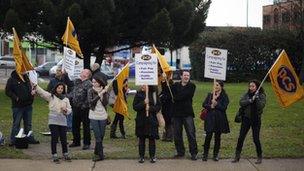PCS union renews pension strike threat
- Published

Hundreds of thousands of public sector staff struck on 30 November in their dispute over pension changes
Leaders of the biggest civil service trade union, the PCS, have threatened more strikes over the government's changes to public sector pensions.
PCS leaders demanded "proper negotiations" over plans to make public sector staff pay more and work longer for their pensions.
The PCS also threatened court action if the government went ahead with its threat to exclude it from more talks.
The government wants to save billions of pounds from its pension bill.
It is planning to make substantial increases in employee contributions in three stages between April this year and April 2015.
Then it plans to bring in new, and less generous, career average pension schemes for most public sector employees, with the pension age rising in line with the increasing state pension age, eventually to 68.
The plans led to a huge, nationwide, strike at the end of November.
'Suffocate'
Since the strike, some unions have committed themselves to further talks while others have rejected the government's outline plans.
For example, the GMB and Prospect unions have agreed to continue to the next stage of negotiations about the civil service pension scheme.
But PCS general secretary Mark Serwotka said: "From the very start, ministers have quite obviously tried to suffocate the pensions talks, to bully and mislead, and to impose their will on millions of civil servants, teachers, council staff and health workers."
"We have told ministers we expect to be included in any future discussions.
"But we are clear that, with no significant movement since two million public servants took strike action together on 30 November, further co-ordinated industrial action will be necessary to stop these unfair and entirely unnecessary plans," he added.